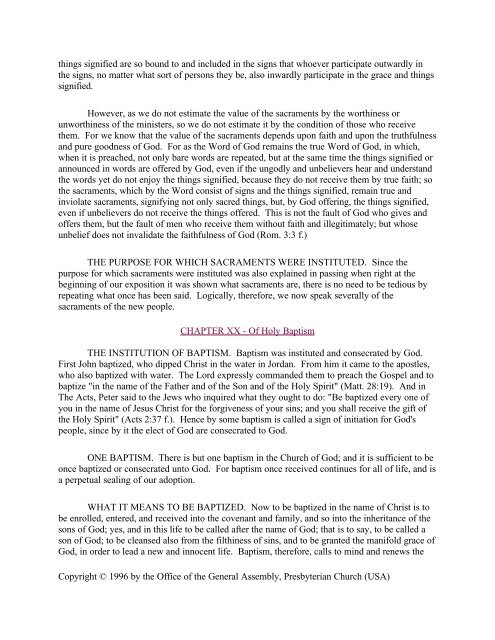The Book of Confessions - The Presbyterian Leader
The Book of Confessions - The Presbyterian Leader
The Book of Confessions - The Presbyterian Leader
You also want an ePaper? Increase the reach of your titles
YUMPU automatically turns print PDFs into web optimized ePapers that Google loves.
things signified are so bound to and included in the signs that whoever participate outwardly in<br />
the signs, no matter what sort <strong>of</strong> persons they be, also inwardly participate in the grace and things<br />
signified.<br />
However, as we do not estimate the value <strong>of</strong> the sacraments by the worthiness or<br />
unworthiness <strong>of</strong> the ministers, so we do not estimate it by the condition <strong>of</strong> those who receive<br />
them. For we know that the value <strong>of</strong> the sacraments depends upon faith and upon the truthfulness<br />
and pure goodness <strong>of</strong> God. For as the Word <strong>of</strong> God remains the true Word <strong>of</strong> God, in which,<br />
when it is preached, not only bare words are repeated, but at the same time the things signified or<br />
announced in words are <strong>of</strong>fered by God, even if the ungodly and unbelievers hear and understand<br />
the words yet do not enjoy the things signified, because they do not receive them by true faith; so<br />
the sacraments, which by the Word consist <strong>of</strong> signs and the things signified, remain true and<br />
inviolate sacraments, signifying not only sacred things, but, by God <strong>of</strong>fering, the things signified,<br />
even if unbelievers do not receive the things <strong>of</strong>fered. This is not the fault <strong>of</strong> God who gives and<br />
<strong>of</strong>fers them, but the fault <strong>of</strong> men who receive them without faith and illegitimately; but whose<br />
unbelief does not invalidate the faithfulness <strong>of</strong> God (Rom. 3:3 f.)<br />
THE PURPOSE FOR WHICH SACRAMENTS WERE INSTITUTED. Since the<br />
purpose for which sacraments were instituted was also explained in passing when right at the<br />
beginning <strong>of</strong> our exposition it was shown what sacraments are, there is no need to be tedious by<br />
repeating what once has been said. Logically, therefore, we now speak severally <strong>of</strong> the<br />
sacraments <strong>of</strong> the new people.<br />
CHAPTER XX - Of Holy Baptism<br />
THE INSTITUTION OF BAPTISM. Baptism was instituted and consecrated by God.<br />
First John baptized, who dipped Christ in the water in Jordan. From him it came to the apostles,<br />
who also baptized with water. <strong>The</strong> Lord expressly commanded them to preach the Gospel and to<br />
baptize "in the name <strong>of</strong> the Father and <strong>of</strong> the Son and <strong>of</strong> the Holy Spirit" (Matt. 28:19). And in<br />
<strong>The</strong> Acts, Peter said to the Jews who inquired what they ought to do: "Be baptized every one <strong>of</strong><br />
you in the name <strong>of</strong> Jesus Christ for the forgiveness <strong>of</strong> your sins; and you shall receive the gift <strong>of</strong><br />
the Holy Spirit" (Acts 2:37 f.). Hence by some baptism is called a sign <strong>of</strong> initiation for God's<br />
people, since by it the elect <strong>of</strong> God are consecrated to God.<br />
ONE BAPTISM. <strong>The</strong>re is but one baptism in the Church <strong>of</strong> God; and it is sufficient to be<br />
once baptized or consecrated unto God. For baptism once received continues for all <strong>of</strong> life, and is<br />
a perpetual sealing <strong>of</strong> our adoption.<br />
WHAT IT MEANS TO BE BAPTIZED. Now to be baptized in the name <strong>of</strong> Christ is to<br />
be enrolled, entered, and received into the covenant and family, and so into the inheritance <strong>of</strong> the<br />
sons <strong>of</strong> God; yes, and in this life to be called after the name <strong>of</strong> God; that is to say, to be called a<br />
son <strong>of</strong> God; to be cleansed also from the filthiness <strong>of</strong> sins, and to be granted the manifold grace <strong>of</strong><br />
God, in order to lead a new and innocent life. Baptism, therefore, calls to mind and renews the<br />
Copyright © 1996 by the Office <strong>of</strong> the General Assembly, <strong>Presbyterian</strong> Church (USA)




